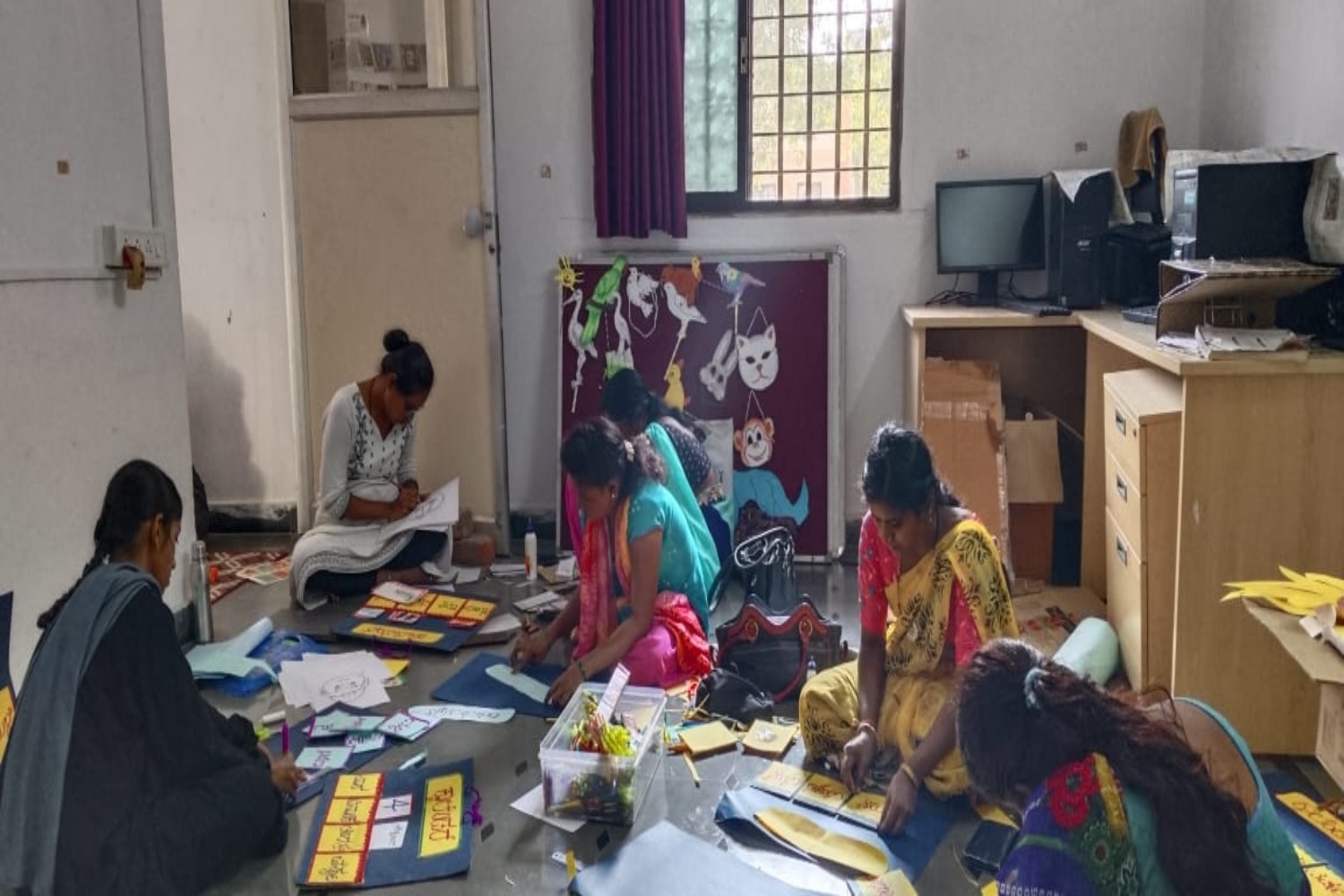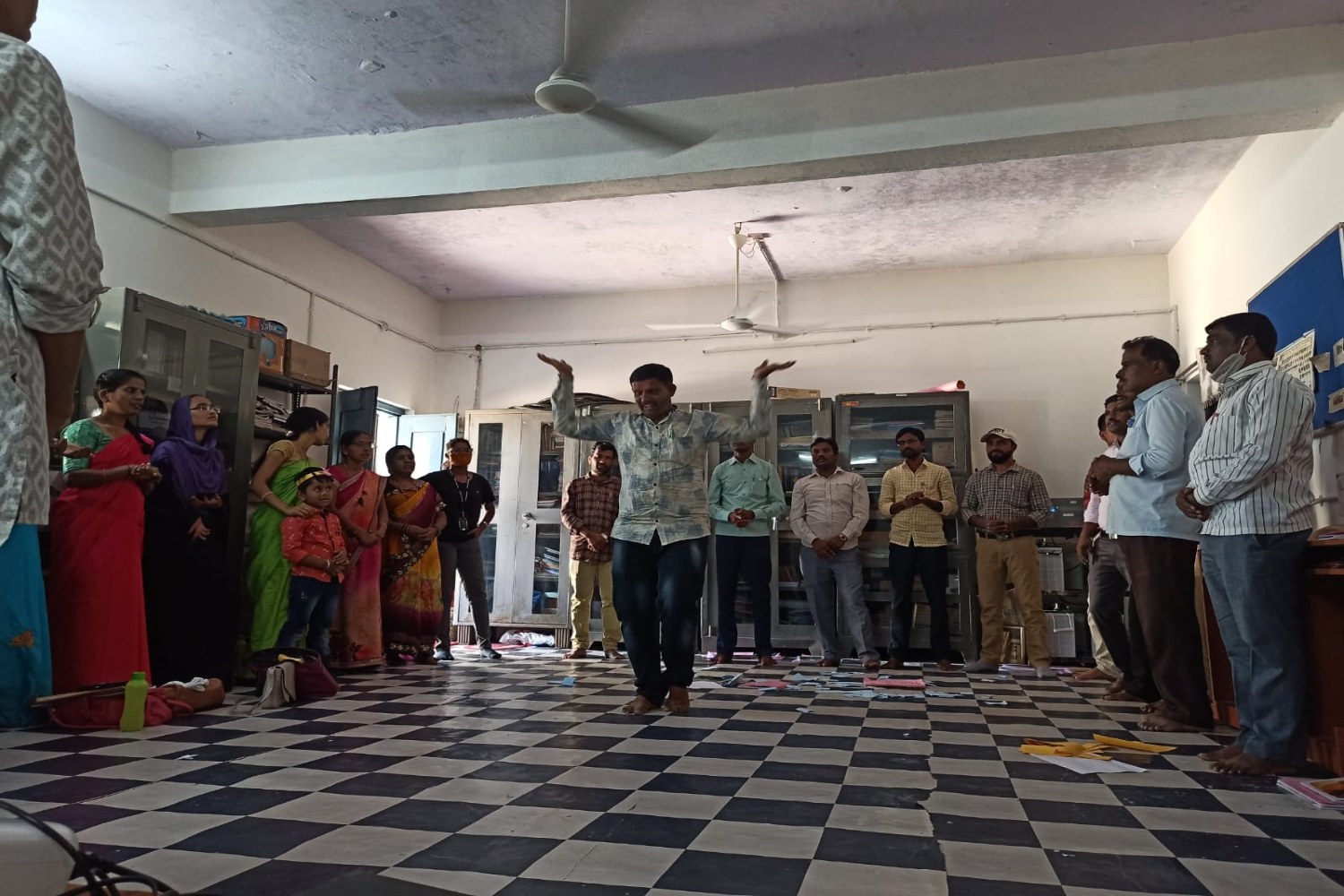Teacher professional development (TPD) in India and Azim Premji Foundation’s efforts in this domain
Archana R and Rishikesh B. S., in their perceptive piece, share with us the work of Azim Premji Foundation in Teacher Professional Development, by focusing on the interventions undertaken in its Teacher Learning Centres.

The criticality of TPD
Teachers have been identified as the most significant of stakeholders in all education policies. Therefore, teacher capacity building has been at the forefront of provisions related to improving the quality of education. More than half a century ago, the Education Commission under the Chairpersonship of Prof. D. S. Kothari (hence, more popularly known as the Kothari Commission) said, “Of all the different factors which influence the quality of education and its contribution to national development, the quality, competence, and character of teachers are undoubtedly the most significant. Nothing is more important than ensuring a sufficient supply of high-quality recruits to the teaching profession, providing them with the best possible professional preparation and creating satisfactory conditions of work in which they can be fully effective” (“The report of the education commission,” 1966). This belief that the education system can only be as good as the teachers in it, and therefore it is imperative that teachers are well-capacitated, has been heard across many reports all over the world.
The policies have also said what should be done to ensure that teacher quality is of the highest standard. The fourth chapter of the Kothari Commission report was entirely focussed on teacher education. It covered topics such as removing isolation of teacher education, improving the quality of the education as well as the institutions, continuous professional development of teachers, and maintenance of standards in teacher education.
Since then, the focus on teacher education has been maintained in all policy reports, including the most recent one – National Education Policy 2020 (NEP). NEP 2020 emphatically states that teachers are the torchbearers of our educational progress. It says, “teachers must be at the centre of the fundamental reforms in the education system. The new education policy must help re-establish teachers, at all levels, as the most respected and essential members of our society, because they truly shape our next generation of citizens. It must do everything to empower teachers and help them to do their job as effectively as possible” (NEP, 2020).

The story so far: lessons from the past and the policy direction
The status of the teacher is not what has been imagined by our policy documents. NEP in fact says, it has “undoubtedly and unfortunately dropped” even further today. To improve the status of teachers in our country and thereby improve the quality of education, one of the most significant aspects is what we do regarding teacher development. Teacher development has always been an important agenda of the Ministry of Education of the Union Government as well as Education Departments of most states.
From the early 2000s, through the Sarva Shiksha Abhiyan (SSA), the entire country witnessed the focus on teacher development through what was known as SSA’s 20- day teacher training. This model has run aground for many reasons. Teachers were disenchanted with training. There are many studies which have indicated that teachers did not find it useful and hence were averse to the idea itself.
For example, using the term “teacher training” is wrong as it implies that teachers are untrained, and worse, that they are without any agency and capacity, and therefore can be “trained.” This perspective ensured that programs for teacher development were designed without taking into consideration what areas the teachers wanted to develop in. These were also implemented in a top-down manner through orders of superiors, rather than considering various needs of the teachers such as content, timing, location, etc., which hardly benefited them in any meaningful way to become better teachers. This approach damaged the idea of teacher development to the extent that teachers have found it to be a waste of their time to attend any development programs.
It is in this context that the idea of teacher development had to be re-introduced to the teachers as an essential component of their professional life. The re-conceptualization had to ensure that the three Ws of TPD – What, Where and When – become part of the teachers’ agency. Today, under NEP 2020, teacher development is not seen as a mere training but as professional development. The policy states that the system should be geared toward providing professional development opportunities for teachers currently serving in a manner that they have the agency to choose how they want to develop their capacity and, in the domains, or topics of their choice.
In this article we present a Teacher Professional Development (TPD) model for in-service teachers that has been used in Azim Premji Foundation for over a decade. This model aligns with the policy recommendations on TPD and takes into account the 3Ws.

TPD through TLCs (teacher learning centres) at Azim Premji Foundation
A TLC is the Foundation’s primary working space that is set up in towns of the blocks (talukas) it works in. It is usually set up within an existing office of the Education Department such as DIET, BRC/BEO office, or a government school. Although the space itself is usually small and limited, the objective is to create a space that is familiar and accessible to teachers.
It is done with the understanding that for a teacher, visiting a TLC should fall within the fold of visiting any education department space. Any process initiated by members of the Foundation team is aligned with the educational objectives of the government or the education department. With this rationalization of the location, the kind of work that has been done in the TLCs over the last decade or more has continuously varied. It has depended on what are teachers’ key needs in the field. This takes care of the “what” and “where” questions of TPD.
TLCs were established as spaces for teachers to come together to meet their learning needs, consistently, and thereby contribute to their professional development. There are multiple modes of engagement that take place in the TLCs. In this article we will focus on two successful approaches using the TLC platforms. The Voluntary Teacher Forums (VTFs) and Evening Discussions are the two approaches we discuss here. What takes place within these two interactions are designed differently. However, both these modes address the third “W” – that is the “when” question – because the principle followed is that they are held when it is most convenient for the teachers to attend.
The VTF is a mode of engagement where a single need is taken up and addressed over a period of time. For example, VTFs have been held regularly on social science and science concepts that the teachers were expected to teach in their classrooms, and English language proficiency sessions for their own development. Teachers attend a series of daily/weekly/fortnightly sessions voluntarily in the evenings to improve their content understanding and its associated pedagogy. The mode for each session also varies from discussing a reading, using models to do the experiments, developing questions to enhance understanding, demonstrations of mock classrooms, developing short writeups, creating posters, or other materials, developing teaching learning materials for classroom usage, and so on.
Evening Discussions is a different kind of forum. It is slightly more informal. However, it is considered as an integral aspect of maintaining a teacher’s curiosity and motivation to learn. Unlike VTFs that are content or subject-specific, evening discussions are more open groups. Here teachers can join in to have an open, lively discussion on any educational topic of choice. The topics chosen are around building educational perspectives. These include policy documents, position papers, articles around learning assessments, larger social issues, or even current events.
The content for a discussion could come from newspaper articles, videos, films, books, journals, or department websites. This mode is being carried on consistently for years. This has created groups of enthusiastic teachers who view Foundation established TLCs as a space for continuous learning. It is also seen as a forum to evolve perspectives, question scenarios, and collectively arrive at informed decisions.
These two modes of teacher engagement have played a significant role in teacher capacity building. These have also helped to evolve conditions that enable teachers to adopt professional development as an essential part of their teaching careers. Along with this, TLCs act as resource centres that have materials such as books, models and equipment. These have a setup that helps teachers to develop materials for any classroom or subject across the various stages of school education. These also have resources and displays that give teachers ideas around content, pedagogy and perspectives.
The success of the Foundation’s TPD model has also shown that it is possible to turn around the “unfortunate and undoubted drop” in teacher education quality that the NEP has flagged. It has also been able to create a positive opinion about teacher development programs among teachers. Along with other modes of teacher engagements such as classroom scaffolding, teacher melas, seminars on crucial topics, etc., it is hoped that Foundation’s efforts contribute toward establishing TPD in the country as envisaged by NEP 2020.

No approved comments yet. Be the first to comment!